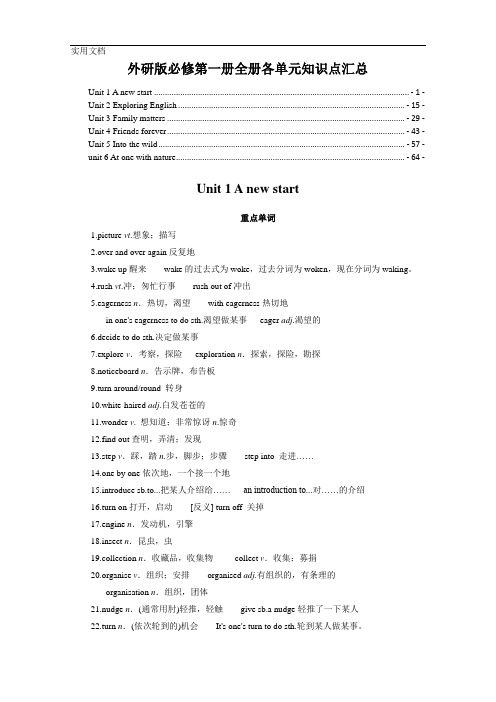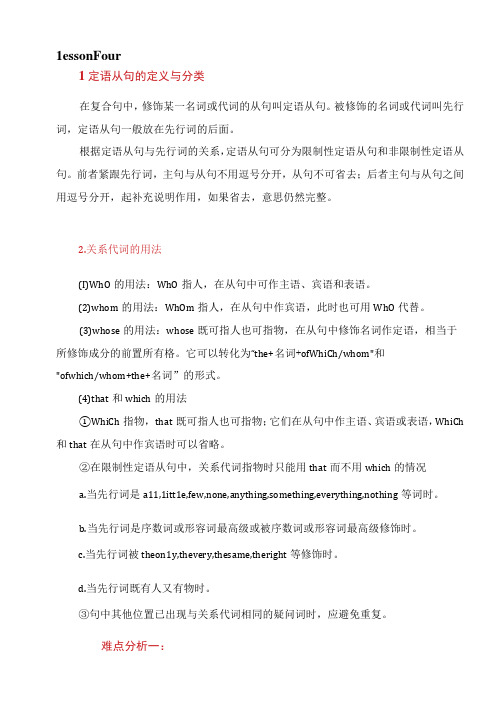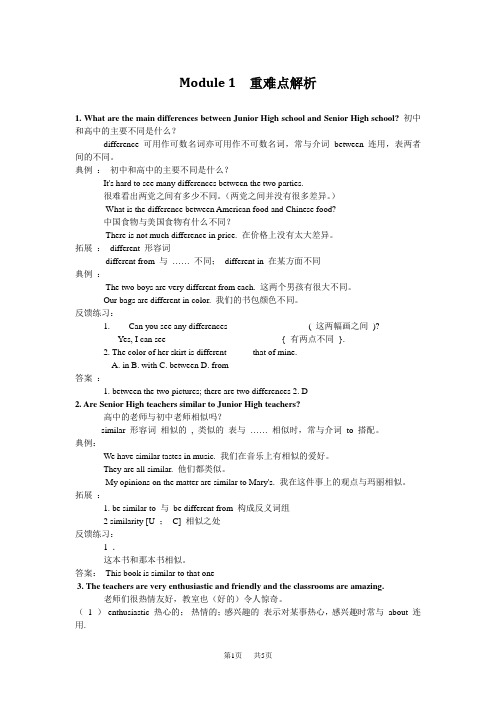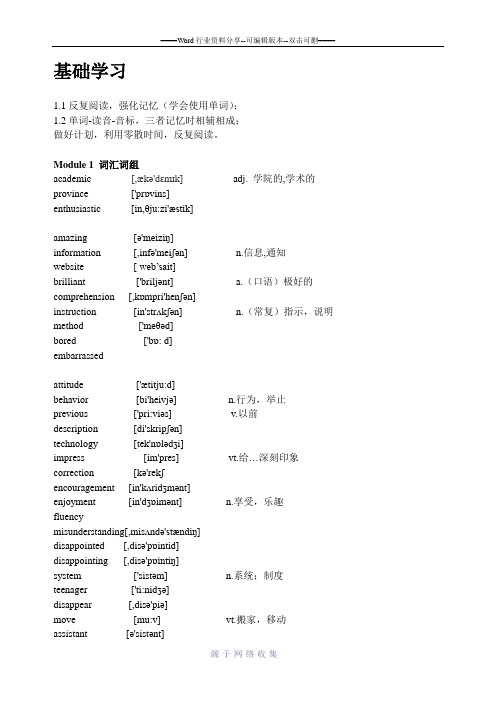高一英语外研版必修一全部语法详解及答案
新外研版高一必修一unit1语法(句子的成分和五种句型)

简单句的五种基本结构以及句子成分了解中英文思维的差别中文重“意”,英文重“形”共同点:陈述对象+陈述内容即主+ 谓(主干)建议:在复习复杂的难句结构时,首先要找到句子的谓语,包括主句的谓语以及各个从句的谓语。
Another way of naming places is naming them after other places. Perhaps they were named to promote friendships between the two places or it could be that the people who used to live there were originally from the places that the roads were named after.(另一个命名地方的方式是以其他地方命名。
也许他们的名字是为了促进两地之间的友谊,也可能是原来住在那里的人是来自于道路得名的地方。
)英语句型的结构:主干+其他成分(从句,介短,非谓,时状)A man was standing at a bus stop eating fish and chips. An old lady and herlittle white dog stood next to him. The dog, excited by the smell of the fish and chips, started to bark and jump up on the man’s leg.“Do you mind if I throw him a bit?”“Not at all,” she said. “Go ahead.”So the man picked up the little dog and threw it over a wall.简单句的五种基本结构以及句子成分句型一、主谓成分一:主语一个句子所叙述的主体,一般位于句首。
(完整)外研版高一英语必修一语法.doc

必修一语法一、一般现在时2.一般现在时的基本用法(1)一般现在时常表经常发生的动作或者经常存在的状态,常与always,often,usually,everyday,sometimes等表示时间的状语连用①,有时候时间状语可以不表达出来②。
由when,while,before,after,until,as soon as等引导的时间状语从句亦可用一般现在时表示经常发生的动作或存在的状态③。
连词if引导的条件从句有时亦可用一般现在时表示经常发生的动作或存在的状态④。
①I go to school everyday.②Where do you live ?③When I come across a new word I consult the English dictionary.④If you speak slowly, I understand. If you speak quickly, I don’t understand.(2)一般现在时常用语一下情况I.表示日常行为①The boys wake up at seven o’clock, wash, dress quickly and run into thedining-room for breakfast. They wait until they hear the bell and then go to school.II.表示习惯、能力①He never wears a hat in winter.(习惯)②Do you drive, John? (能力)III.表示客观存在①The earth moves round the sun.②Time and tide wait for no man. 岁月不等人IV.报章、杂志、书籍不强调过去时间、单纯表示客观事实(即所载文字依然存在)时,亦用一般现在时①What does the newspaper say?3.一般现在时表现在(1)表说话时刻,这一时刻往往是很短暂的①。
新教材-外研版高中英语必修第一册全册各单元知识点提炼汇总(单词短语句型语法等详解及扩展)

外研版必修第一册全册各单元知识点汇总Unit 1 A new start .................................................................................................................... - 1 -Unit 2 Exploring English ....................................................................................................... - 15 -Unit 3 Family matters ............................................................................................................ - 29 -Unit 4 Friends forever............................................................................................................ - 43 -Unit 5 Into the wild ................................................................................................................ - 57 -unit 6 At one with nature........................................................................................................ - 64 -Unit 1 A new start重点单词1.picture vt.想象;描写2.over and over again反复地3.wake up醒来wake的过去式为woke,过去分词为woken,现在分词为waking。
2022-2023学年高中英语外研版(2019)必修第一册语法填空解析讲义

2022外研版-必修一(语法填空解析+专项练习)语法填空解析方法:第一步:句子成分划分第二部:确定词性第三部:用单词正确形式填空有提示词类:高频考点:1:谓语动词:时态,语态,主谓一致2:非谓语动词:to do不定式,v-ing, v-ed3: 名词:主要考查可数名词---单数,复数4:形容词,副词:考察adj-adv词性互换,比较级或最高级5:派生词:动词—名词,名词—形容词,动词,形容词—副词低频考点:1:代词:一般给出人称代词的主格,考查其宾格,名词性或形容词性物主代词及反身代词。
无提示词类:高频考点:1:介词:考查介词的基本用法或固定搭配2:冠词:考查冠词的特指,泛指或固定搭配。
3:关系连词:侧重考查定语从句的关系连词。
以及名词性从句,状语从句。
4:构成强调句结构的it或that,作形式主语或形式宾语的it.常见语法易错点1:one of +the+adj最高级+n复数。
2:to do不定式表目的3:表被动(by提示词),情态动词+V-ed4:(and,but,or并列句):(一):词性---形容词,副词,名词可数不可数,保持一致(二):n词单复数(三):时态保持一致---最常考过去时5:常考特殊句型,短语:(一):Start doing/start to do sth begin doing/ begin to do sth(二): It is/was +a/adj+ (for sb)+to do sth(三):Avoid doing stop doing enjoy oneself6: 现在分词V-ing表主动,过去分词V-ed表被动7:序数词:one, two, three----first, second, third8:结构:the+ n.+ of9:Adv常考结构:结构1:_______ +动词,或者动词+______.结构2:__________+形容词。
结构3:_______,+一个完整的句子。
外研版新版必修一UnitFour(Friendsforever)语法讲解

1essonFour1定语从句的定义与分类在复合句中,修饰某一名词或代词的从句叫定语从句。
被修饰的名词或代词叫先行词,定语从句一般放在先行词的后面。
根据定语从句与先行词的关系,定语从句可分为限制性定语从句和非限制性定语从句。
前者紧跟先行词,主句与从句不用逗号分开,从句不可省去;后者主句与从句之间用逗号分开,起补充说明作用,如果省去,意思仍然完整。
2.关系代词的用法(I)WhO的用法:WhO指人,在从句中可作主语、宾语和表语。
(2)whom的用法:WhOm指人,在从句中作宾语,此时也可用WhO代替。
(3)whose的用法:whose既可指人也可指物,在从句中修饰名词作定语,相当于所修饰成分的前置所有格。
它可以转化为“the+名词+ofWhiCh/whom"和"ofwhich/whom+the+名词”的形式。
(4)that和which的用法①WhiCh指物,that既可指人也可指物;它们在从句中作主语、宾语或表语,WhiCh 和that在从句中作宾语时可以省略。
②在限制性定语从句中,关系代词指物时只能用that而不用which的情况a.当先行词是a11,1itt1e,few,none,anything,something,everything,nothing等词时。
b.当先行词是序数词或形容词最高级或被序数词或形容词最高级修饰时。
c.当先行词被theon1y,thevery,thesame,theright等修饰时。
d.当先行词既有人又有物时。
③句中其他位置已出现与关系代词相同的疑问词时,应避免重复。
难点分析一:(I)Whatif用于提出假设时,意思是“倘若……,假若……怎么办,要是……将会怎么样”,其后句子可用陈述语气(一般现在时),也可用虚拟语气(一般过去时或ShOUk1+动词原形;若是针对过去情况,从句则用过去完成时)。
(2)Whatif表示邀请或建议时,意思是“……怎么样?如果……如何?”。
高一英语外研版必修一英语重难点解析

Module 1 重难点解析1. What are the main differences between Junior High school and Senior High school?初中和高中的主要不同是什么?difference 可用作可数名词亦可用作不可数名词,常与介词between 连用,表两者间的不同。
典例:初中和高中的主要不同是什么?It's hard to see many differences between the two parties.很难看出两党之间有多少不同。
(两党之间并没有很多差异。
)What is the difference between American food and Chinese food?中国食物与美国食物有什么不同?There is not much difference in price. 在价格上没有太大差异。
拓展:different 形容词different from 与…… 不同;different in 在某方面不同典例:The two boys are very different from each. 这两个男孩有很大不同。
Our bags are different in color. 我们的书包颜色不同。
反馈练习:1. ----- Can you see any differences __________________( 这两幅画之间)?-----Yes, I can see __________________________{ 有两点不同}.2. The color of her skirt is different _____ that of mine.A. inB. withC. betweenD. from答案:1. between the two pictures; there are two differences2. D2. Are Senior High teachers similar to Junior High teachers?高中的老师与初中老师相似吗?similar 形容词相似的, 类似的表与…… 相似时,常与介词to 搭配。
外研版-高一英语-必修一-Module1-语法总结

基础学习1.1反复阅读,强化记忆(学会使用单词);1.2单词-读音-音标,三者记忆时相辅相成;做好计划,利用零散时间,反复阅读。
Module 1 词汇词组academic [,ækə'dɛmɪk]adj. 学院的,学术的province ['prɒvins]enthusiastic [in,θju:zi'æstik]amazing [ə'meiziŋ]information [,infə'meiʃən] n.信息,通知website [ web’sait]brilliant ['briljənt] a.(口语)极好的comprehension [,kɒmpri'henʃən]instruction [in'strʌkʃən] n.(常复)指示,说明method ['meθəd]bored ['bɒ: d]embarrassedattitude ['ætitju:d]behavior [bi'heivjə] n.行为,举止previous ['pri:viəs] v.以前description [di'skripʃən]technology [tek'nɒlədʒi]impress [im'pres] vt.给…深刻印象correction [kə'rekʃencouragement [in'kʌridʒmənt]enjoyment [in'dʒɒimənt] n.享受,乐趣fluencymisunderstanding[,misʌndə'stændiŋ]disappointed [,disə'pɒintid]disappointing [,disə'pɒintiŋ]system ['sistəm] n.系统;制度teenager ['ti:nidʒə]disappear [,disə'piə]move [mu:v] vt.搬家,移动assistant [ə'sistənt]cover ['kʌvə]diploma [di'pləumə] n.毕业文凭,学位证书重点词组in other words 换句话说look forward to doing sth. 期待;盼望look for 寻找be impressed with 对…印象深刻be different from 与…不同at the start of 在……开始的时候at the end of 在……结束的时候be divided into 被(划)分成……take part in 参加主语:句子或者句意的主要人物或事物,一般在句首。
外研版高一英语课本语法梳理(必修1-5):Module 2(含解析)

外研版高一必修一Module 2【教材同步一点通】【要点梳理,不容错过】【能力提升】【Exercise】1.Jiaxing is such a beautiful city that it is well worth _____.A.visitB. visitingC. visitedD. to visit2.I still remember _____ to The Famen Temple and what I saw there.A.to takeB. to be takenC. takingD. being taken3.-----What would you rather ______?-----I’d prefer _____ a cup of tea, if possible.A.have ;to haveB. to have ;havingC. to have; to haveD. having;to have4.George is going to talk about the geography of his country,but I’d rather he ____ more onits culture.A.focusB. focusedC. would focusD. had focused5.(2012黑龙江大庆模拟)Most of what has been said about the Smith is also______the Johnsons.A.true toB. true ofC. the same ofD. true with6.It doesn’t matter ______ you pay by cash or credit card in this store.A.howB. whetherC. whatD. Why7.Don’t worry ; the guide will tell you how to avoid ______ ill while travelingA. to getB.being gottenC. gettingD. to be getting8.---- I usually go there by train.----- Why not ______ by boat for a change?A.to try goingB. trying to goC. to try and goD. try going9.I find painting and listening to music _______.A.relaxingB. is relaxingC. relaxedD. are relaxed10.I prefer ____ the movies rather than _____ at home.A. go to; stayB. to go to,stayC. going to ;stayingD.to go to;staying【能力提升】1.我宁愿待在家里而不愿外出。
- 1、下载文档前请自行甄别文档内容的完整性,平台不提供额外的编辑、内容补充、找答案等附加服务。
- 2、"仅部分预览"的文档,不可在线预览部分如存在完整性等问题,可反馈申请退款(可完整预览的文档不适用该条件!)。
- 3、如文档侵犯您的权益,请联系客服反馈,我们会尽快为您处理(人工客服工作时间:9:00-18:30)。
外研版必修一翻译下列词组:1.喜欢干某事(enjoy)_____________________喜欢干某事(like)___________________________________________2.讨厌干某事(dislike)_____________________讨厌干某事(hate)___________________________________________3.一直在外面等_________________________4.练习说英语_________________________5.建议早出发__________________________________________________6.停止谈话_________________________停下来谈话________________________7.忘记去关灯_______________________忘记已关灯________________________8.继续工作____________________________________________________9. mean to do sth_______________________mean doing sth______________________10.try doing sth_______________________try to do sth________________________三、情景解疑:填空:1. Would you mind my___________(打开)the window?2. He considered______________(买)a car.3. It took the workmen only two hours to finish ________(修理)my car.4. Can you imagine yourself ______ on a lonely island? (stay)5. I can't understand your ______ at that poor child.(laugh)选择:1.We appreciate us to the ball.A.them to inviteB.to inviteC.their invitingD.being invited2. I delayed your letter because I had been away for a week.A.answerB.answeringC.writingD.to post3. The thief drove as fast as he could to escape by the police.A.to be caughtB.he caughtC.being caughtD.catching4. —Where is my passport? I remember it here.—You shouldn't have left it here. Remember it with you all the time.A.to put;to takeB.putting;takingC.putting;to takeD.to put;taking5. After finishing his homework he went on a letter to his parents.A.writeB.writingC.wroteD.to write四.合作探究:v-ing形式从性质上讲相当于名词,形容词和副词。
在句中充当主语、表语、定语、宾语、补语,本模块主要学习v-ing形式作宾语。
A. 请分析并标出以下句子中v-ing形式充当的句子成分:1.Nodding the head means agreement. _____________2.His job is selling newspapers. _____________3.I suggested asking his father for some money. ______________4.There is a swimming pool in our school.______________5.I saw him crossing the road. ______________B. 翻译下面两组句子:1.The classroom wants/requires cleaning. ___________________________。
I want to clean the room. ___________________________。
2. My shoes need mending. ____________________________。
He needs to repair his car. _____________________________。
分析每组中的两句话得出:Sth needs/wants/requires doing中doing 是_______表示__________。
五.巩固检测:1.The sentence needs.A.improveB.a improvementC.improvingD.improved2. Would you mind quiet for a moment? I'm trying a form.A.keeping;filling outB.to keep;to fill outC.keeping;to fill outD.to keep;filling out3. The young trees we planted last week require with great care.A.looking afterB.to look afterC.to be looked afterD.taken good care of4. No one can avoid ____ by advertisements.A. to be influencedB. being influencedC. influencingD. having influence5. The suspect at last admitted ____ stolen goods but denied ____ them.A. receiving...sellingB. to receive...to sellC. to receiving...to sellingD. to have received...to have sold6. Please stop ____, boys, I have something important to ____ you.A. saying ...talkB. telling ... sayC. talking ...speakD. talking ... tell7. John regretted ____ to the meeting last week.A. not goingB. not to goC. not having been goingD. not to be going8. It is difficult to get used ____ in a tent after having a soft, comfortable bed to lie on.A. sleepB. to sleepingC. sleptD. to sleep9. He is very busy ____ his papers. He is far too busy ____ callers.A. to write...to receiveB. writing...to receiveC.writing...receivingD.to write...for receiving10. It is no good ____ remember grammatical rules. You need to practise what you have learned.A. trying toB. to try toC. try toD. tried to语法二:过去分词作定语I.翻译下列短语和句子,并试着总结一下它们的共同之处。
1. boiled water2. a developed country3. fallen leaves4. streamed bread5. a retired worker6. a broken glass7. We didn’t know how to deal with the changed situations..8. We need more qualified teachers. .过去分词作定语要点归纳:1.过去分词作定语,分词所表示的动作与被修饰词之间存在着逻辑上的被动关系,且表示该动作已经完成。
e.g. We all like the photographs taken by our teachers.2. 单个的过去分词作定语,常可置于被修饰词之前或之后;而过去分词短语作定语,通常置于被修饰词之后。
【注意】leave的过去分词left表示“剩余的,剩下的”时,要置于被修饰词之后。
e.g. The injured workers are now in the hospitals.Is there anybody injured?The Olympic Games first held in 776 BC did not include women competitors until 1912.There is only one minute left.3.过去分词作定语时,可转换为一个定语从句。
e.g. We all like the photographs (which were) taken by our teachers.The play (which was) put on by the teachers was a big success.四.合作探究【思考】读下列例句,说说动词-ing形式和过去分词作定语的区别是什么?①②五.巩固检测I. 今天的内容你学会了吗?1. The questions at yesterday’s meeting hasn’t been made yet.A. discussing; knowB. discussed; knownC. being discussed; knowD. to be discussed; know2. The disc, digitally in the studio, sounded fantastic at the party that night.A. recordedB. recordingC. to be recordedD. having recorded3. What’s the language in Germany?A. speakingB. spokenC. be spokenD. to speak4. After a fire broke out in the lab, a lot of equipment .A. is damagedB. had damagedC. damagedD. was damaged5. They on the program for almost one week before I joined them, and now we on it as no good results have come out so far.A. had been working; are still workingB. had worked; were still workingC. have been working; have workedD. have worked; are still working语法三:现在完成时用以下短语填空so far for a long time up to now in the past ten years since then1. Great! I’ve been longing to visit the exhibition on the western artists .2. as I know, everybody wants to be a model student.3. Great changes have taken place in our hometown.4. I’ve never met him.5. Things have not change very much .三.情景解疑现在完成时1. 构成:has / had + 动词的过去分词2. 基本用法:①表示过去发生或已经完成的动作对现在造成的影响和结果。
